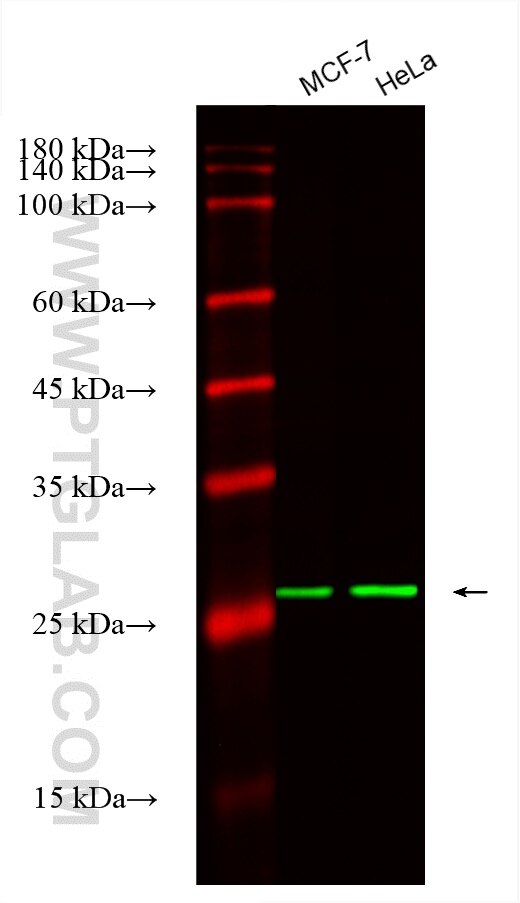Tested Applications
| Positive WB detected in | MCF-7 cells, HeLa cells |
Recommended dilution
| Application | Dilution |
|---|---|
| Western Blot (WB) | WB : 1:2000-1:16000 |
| It is recommended that this reagent should be titrated in each testing system to obtain optimal results. | |
| Sample-dependent, Check data in validation data gallery. | |
Product Information
CL488-67817 targets PSMA7 in WB applications and shows reactivity with Human, mouse, rat samples.
| Tested Reactivity | Human, mouse, rat |
| Host / Isotype | Mouse / IgG1 |
| Class | Monoclonal |
| Type | Antibody |
| Immunogen | PSMA7 fusion protein Ag7821 Predict reactive species |
| Full Name | proteasome (prosome, macropain) subunit, alpha type, 7 |
| Calculated Molecular Weight | 28 kDa |
| Observed Molecular Weight | 28-30 kDa |
| GenBank Accession Number | BC004427 |
| Gene Symbol | PSMA7 |
| Gene ID (NCBI) | 5688 |
| RRID | AB_3672964 |
| Conjugate | CoraLite® Plus 488 Fluorescent Dye |
| Excitation/Emission Maxima Wavelengths | 493 nm / 522 nm |
| Form | Liquid |
| Purification Method | Protein G purification |
| UNIPROT ID | O14818 |
| Storage Buffer | PBS with 50% glycerol, 0.05% Proclin300, 0.5% BSA , pH 7.3 |
| Storage Conditions | Store at -20°C. Avoid exposure to light. Stable for one year after shipment. Aliquoting is unnecessary for -20oC storage. |
Background Information
PSMA7(Proteasome subunit alpha type-7) is also named as HSPC and belongs to the peptidase T1A family. It is an α-type subunit of the 20S proteasome core complex and participates in degrading proteins through ubiquitin-proteasome pathway (UPP) which plays an important role in the regulation of cell proliferation or cell cycle control, transcriptional regulation, immune and stress response, cell differentiation, and apoptosis.(PMID: 19442227).
Protocols
| Product Specific Protocols | |
|---|---|
| WB protocol for CL Plus 488 PSMA7 antibody CL488-67817 | Download protocol |
| Standard Protocols | |
|---|---|
| Click here to view our Standard Protocols |



